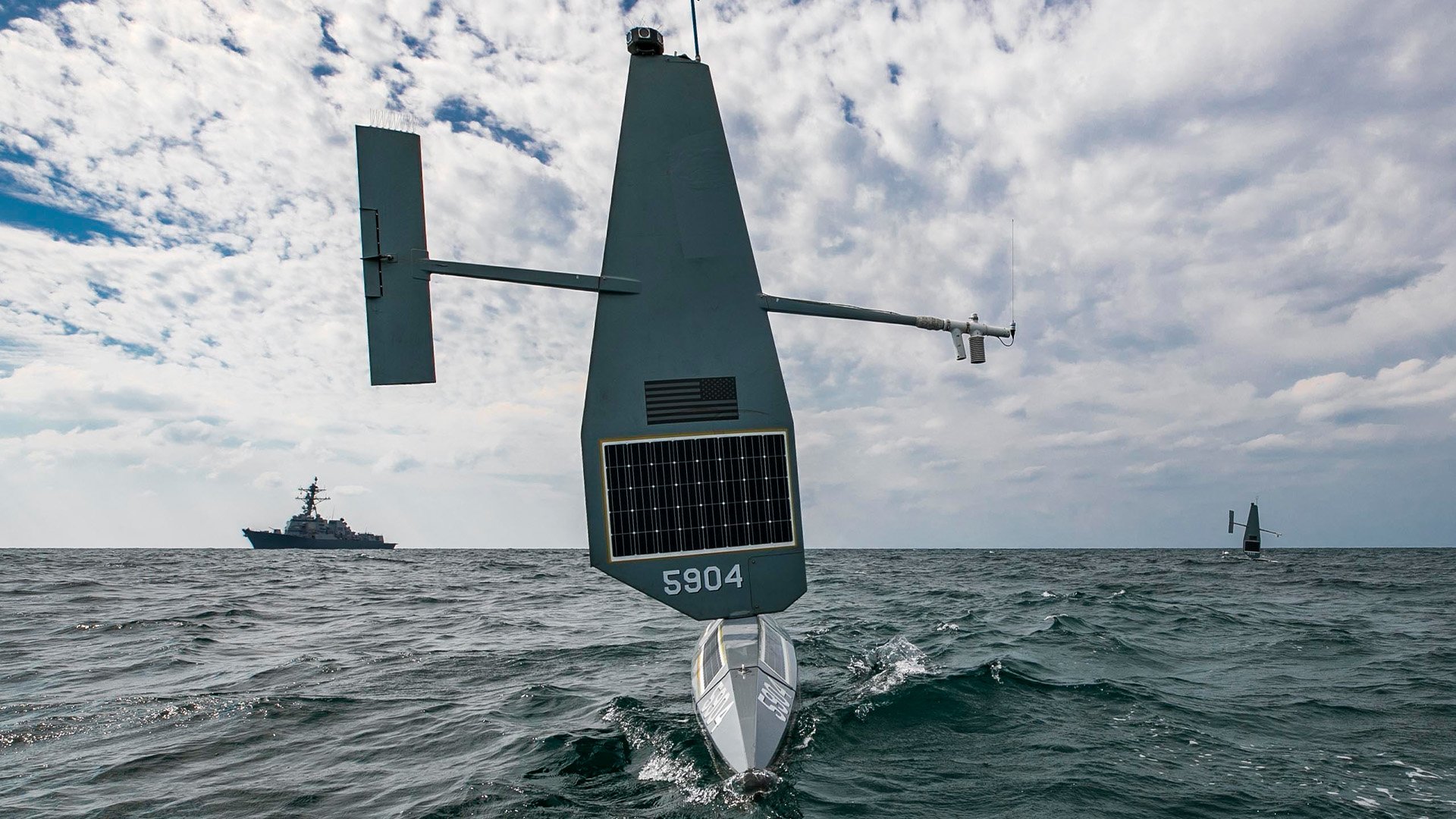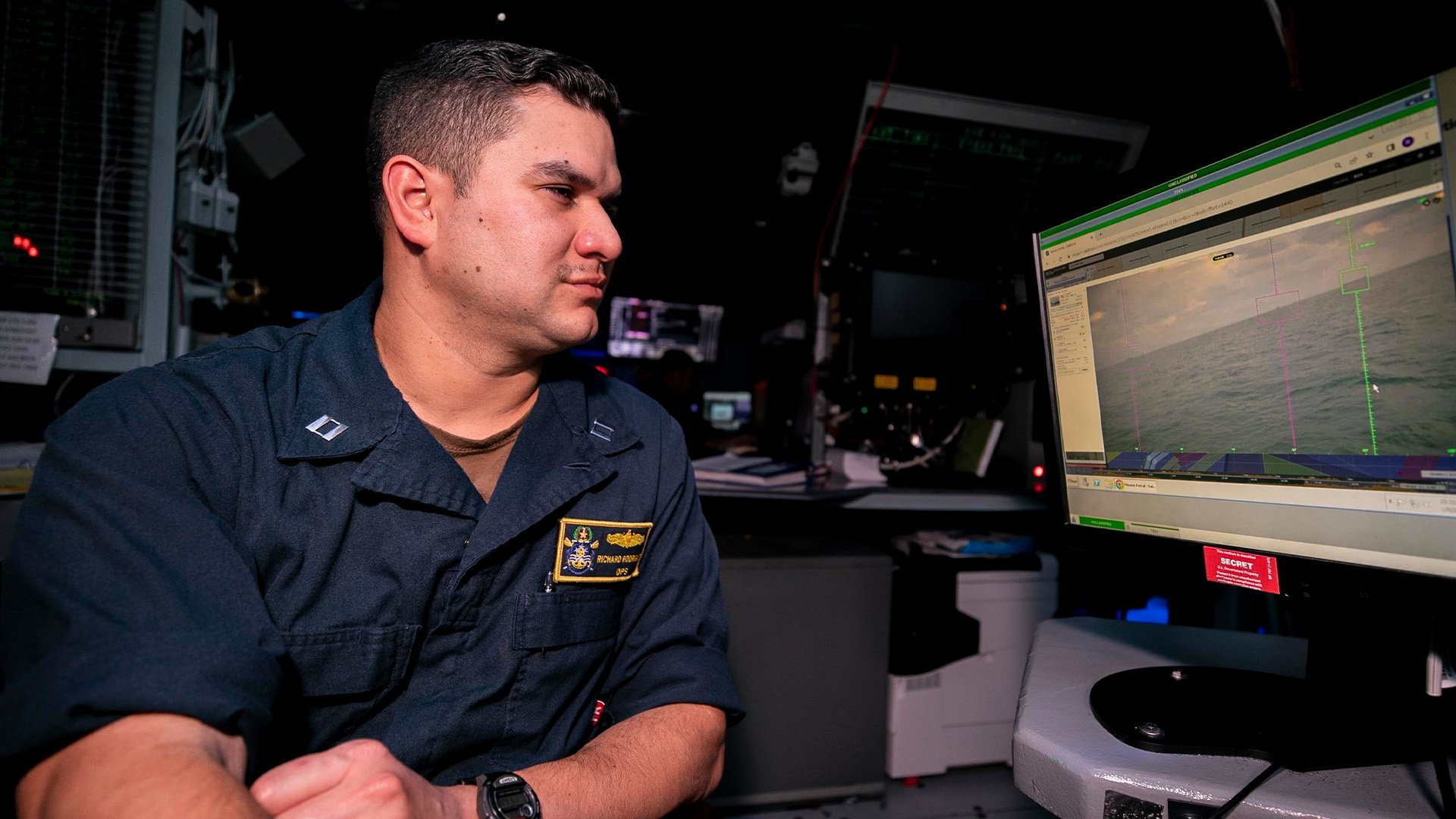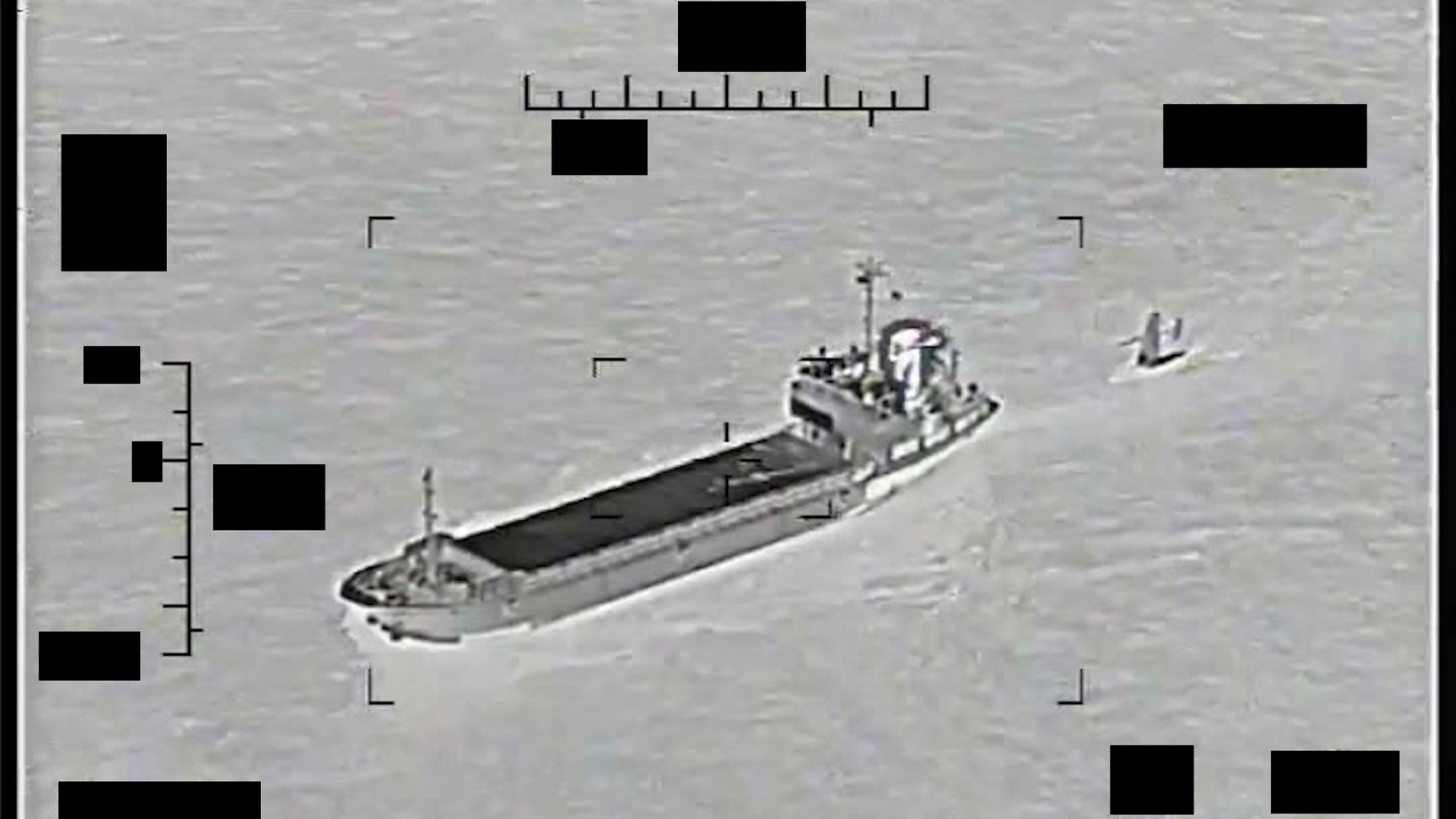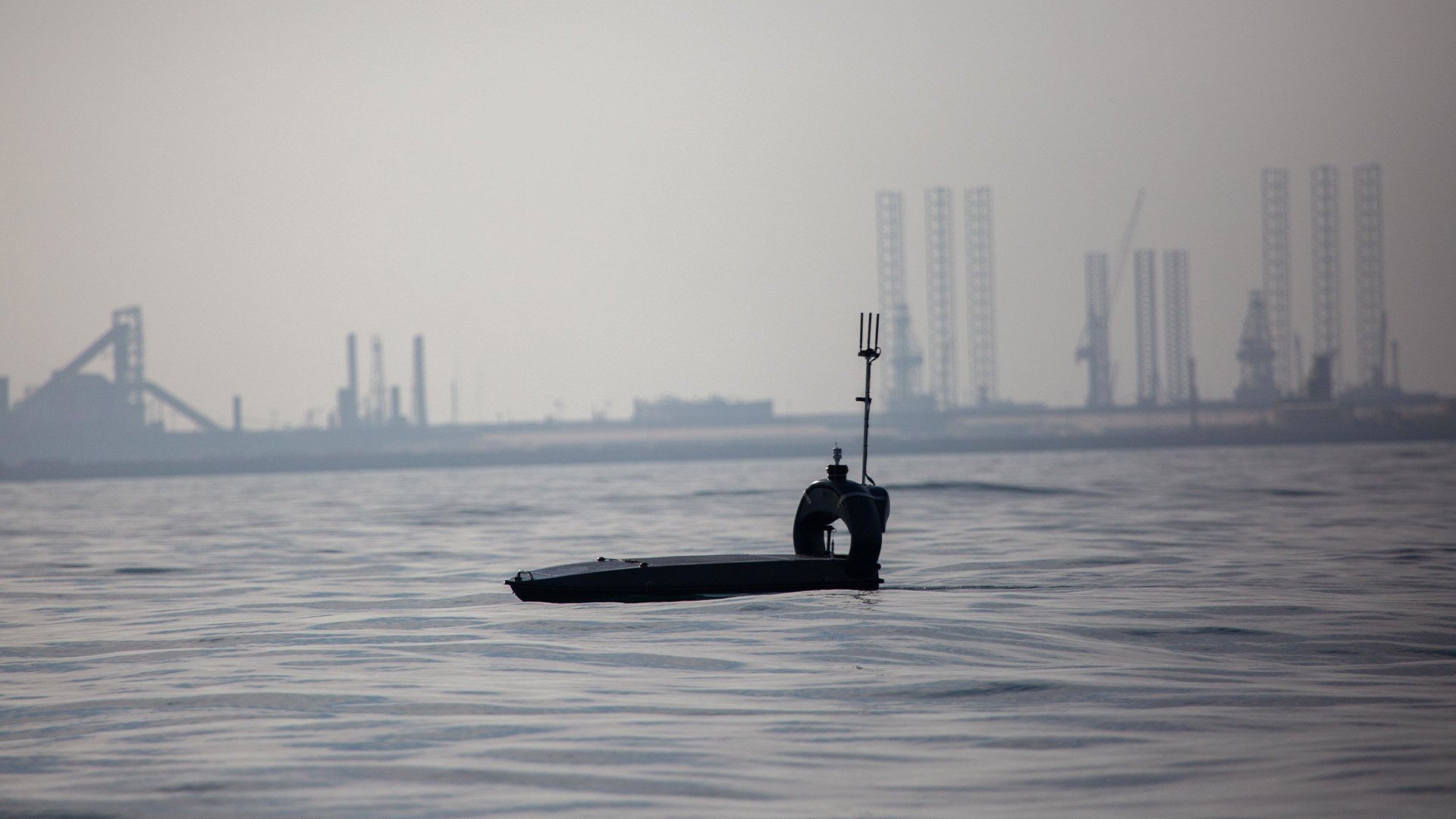
Two Saildrone Explorers, robot surface vessels, ply the Persian Gulf near the the guided-missile destroyer Delbert D. Black on Jan. 8, 2022. US Navy photo by Mass Communication Specialist 2nd Class Jeremy R. Boan.
The US Navy took another step toward launching an unmanned fleet in the Middle East, thanks to two Saildrone Explorers that reported for temporary duty last week.
The robots bobbed in the Persian Gulf from Saturday, Jan. 7, through Monday morning, beaming visual descriptions of what they saw to the nearby guided-missile destroyer Delbert D. Black and Coalition Task Force Sentinel ashore headquarters in Bahrain.
“We observed real-world commercial traffic for training purposes,” US 5th Fleet spokesperson Cmdr. Timothy Hawkins told Coffee or Die Magazine on Monday.
Hawkins dubbed the drones’ three-day mission “successful” because it “further demonstrated the value of integrating new unmanned systems and artificial intelligence with crewed vessels to enhance our vigilance above, on, and below regional waters.”

Inside the combat information center on board the guided-missile destroyer Delbert D. Black on Jan. 8, 2023, in the Persian Gulf, Lt. Richard Rodriguez observes visual footage transmitted from a Saildrone Explorer unmanned surface vessel. US Navy photo by Mass Communication Specialist 2nd Class Jeremy R. Boan.
On Aug. 30, the US 5th Fleet’s patrol coastal ship Thunderbolt stopped Iran’s Islamic Revolutionary Guard Corps Navy support ship Shahid Baziar from towing away a plundered SailDrone, but there were no shenanigans from Tehran during this exercise.
Perhaps that’s because an Arleigh Burke-class destroyer was on the prowl nearby.
“Saildrones transmitted information on contacts of interest and our watch officers coordinated with the destroyer for further monitoring,” said US Navy Capt. Brian Granger, Coalition Task Force Sentinel’s deputy commander, in a prepared statement.
Granger’s task force is the operational wing of what’s called the “International Maritime Security Construct.”

The Iranian support ship Shahid Baziar, left, from Iran's Islamic Revolutionary Guard Corps Navy, tried to make off with a Saildrone Explorer unmanned surface vessel in international waters of the Persian Gulf on Aug. 30, 2022. US Navy photo.
It was founded in 2019 by Albania, Bahrain, Estonia, Latvia, Lithuania, Romania, Saudi Arabia, Seychelles, United Arab Emirates, United Kingdom, and the US to better safeguard the sea lanes used by oil tankers in the Persian Gulf, Gulf of Oman, Gulf of Aden, and Red Sea.
In late November, Sentinel’s sailors unleashed a robot flotilla, with Saildrones plying the Persian Gulf alongside Elbit Systems’ Seagull; the Exail DriX; L3Harris’ Arabian Fox MAST-13; Marine Advanced Robotics’ WAM-V; MARTAC’s T-38 Devil Ray; the Ocean Aero TRITON sub; Open Ocean Robotics’ Data Xplorer; Seasats’ X3; and SeaTrac’s SP-48.
Above them hovered the V-BAT, built by Aerovel’s Flexrotor and Shield AI, and Easy Aerial’s tethered spy drone.

An Open Ocean Robotics Data Xplorer unmanned surface vessel operates in the Persian Gulf on Nov. 29, 2022, during Digital Horizon 2022, a three-week event designed to introduce new unmanned and artificial intelligence systems to Middle Eastern waters. US Army photo by Sgt. Brandon Murphy.
Whether these robots are standing watch for Task Force Sentinel in the Middle East or deployed by US warships worldwide, Pentagon planners see the crewless crafts as tireless spies providing round-the-clock “maritime domain awareness.”
They scan above and below the waves for vessels that don’t transmit their positions to the world, and then use encrypted satellite links to report to US forces where the mystery ships are going.
The robots are expected to continue taking over monotonous and dangerous tasks previously performed by people, but commanders often remain mum about how long the drones deploy for duty and what, exactly, they do while on watch.
It was no different with the latest test of the two Saildrone Explorers.
“For reasons you can appreciate, I won’t go into specifics beyond what we released in the statement regarding the tactical employment of the unmanned assets,” said 5th Fleet’s Cmdr. Hawkins.
Read Next: Defying Beijing, US Navy Warship Sails Taiwan Strait

Carl Prine is a former senior editor at Coffee or Die Magazine. He has worked at Navy Times, The San Diego Union-Tribune, and Pittsburgh Tribune-Review. He served in the Marine Corps and the Pennsylvania Army National Guard. His awards include the Joseph Galloway Award for Distinguished Reporting on the military, a first prize from Investigative Reporters & Editors, and the Combat Infantryman Badge.
BRCC and Bad Moon Print Press team up for an exclusive, limited-edition T-shirt design!
BRCC partners with Team Room Design for an exclusive T-shirt release!
Thirty Seconds Out has partnered with BRCC for an exclusive shirt design invoking the God of Winter.
Lucas O'Hara of Grizzly Forge has teamed up with BRCC for a badass, exclusive Shirt Club T-shirt design featuring his most popular knife and tiomahawk.
Coffee or Die sits down with one of the graphic designers behind Black Rifle Coffee's signature look and vibe.
Biden will award the Medal of Honor to a Vietnam War Army helicopter pilot who risked his life to save a reconnaissance team from almost certain death.
Ever wonder how much Jack Mandaville would f*ck sh*t up if he went back in time? The American Revolution didn't even see him coming.
A nearly 200-year-old West Point time capsule that at first appeared to yield little more than dust contains hidden treasure, the US Military Academy said.












